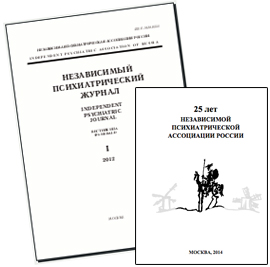Abstracts of №3, 2016
Open to discussion notes on modern psychiatry (Methodological aspect)
A.E.Bobrov
The changes in psychiatry in Russia for the last decades have produced influence as on clinical practice as well as on scientific research. In practical respect it should be noted adoption of ICD-10, spreading of psychotherapy and psychological rehabilitation, changes in pharmacological and other biological methods of treatment, widening of paraclinical diagnostics, as well as changes in understanding of nature and clinics of a number of mental disorders. In theoretical regard in these years the eclectic bio-psych-social approach has been strengthened and the traditional doctrine of nosology has been repudiated. The methodology of evidence-based medicine has shown not only its advantages but also limitations as well. Actually all hopes for fast development of pathogenic methods of therapy of mental diseases have vanished. Collisions with medico-legal status of psychiatric diagnosis have not vanished and continue to negatively effect on development of important trends of psychiatry. All the above said is connected with historically influenced changes of the subject and the method of psychiatry. Its further development demands methodological analysis and preference to categorical system, which could integrate biological, psychological and social understanding of nature of mental disorders from single methodological positions. Such system originates from the cognitive paradigm connected with informatization and individualization of psychiatric care which in the last decade has won recognition.
Key words: achievements of Russian psychiatry, new theoretical framework, stages of development of Russian psychiatry, bio-psycho-social approach, nosology, evidence-based medicine, cognitive paradigm
Is it possible to exhaust psychopathology?
Yu.S.Savenko
Well known impossibility to exhaust psychopathology is already not a platitude in the atmosphere of contemporary scientific fashion. Presented here are some actual trends of development.
Key words: psychopathology, trends of development of ICD and DSM, regress of clinical psychiatry
Chronobiological characteristics of the structure of exacerbations and therapy of depression in the northern region
T.L.Kot (Khanty-Mansiysk)
A retrospective analysis of medical records of patients of Khanty-Mansiysk clinical mental out-patient center with endogenous depression (the first subgroup) and depression caused by exogenous factors (the second subgroup) was held. The analysis used data from meteorological observations, defining characteristic of the region, the length of the seasons. Significant differences in the seasonality of exacerbations were observed in both groups. Bouts of depression vary in severity in different seasons in both subgroups. There are seasonal characteristics in the prescription of antidepressants.
Key words: depressive disorders, seasonality, photoperiod, severity of depression, antidepressants.
The principle of presumption of citizen’s mental health in the law and law enforcements practice
Yu.N.Argunova
Presented is the practice of using the institute of presumption of mental health (presumption of absence of mental disorder) in civil process.
Key words: presumption of mental health
Ethics, the law and human rights
Yu.S.Savenko, L.N.Vinogradova
The necessity of clearness regarding concepts of ethics, law and human rights is connected with numerous distortions of these concepts in our literature and with disastrous state of realities concerning them.
Key words: ethics, law, human rights, rights of persons with mental disorders.
Features of work of psychiatrist of Regional consultative diagnostic center of Subarctic Territory
L.A.Shapovalova, K.A. Shapovalov (Syktyvkar)
The features of the psychiatrist regional consultative and diagnostic center, located in the subarctic region of Russian Federation (RF), characterized by harsh climate, increased swamping, excessive drainage network, a low density of roads and rail lines. The analysis of the incidence of 5356 patients referred for outpatient psychiatrist in 2010-2012 based on statistical coupons. The results of the practical work of the psychiatrist advisory department of diagnostic center are discussed. Assesses the scientific, organizational, methodological, and health education activities of practitioner — patient psychiatric care. In the consulting and diagnostic center structure adopted by a psychiatrist outpatient primary dominated patients (51.6±0.7%). Delectability of psychiatric pathology in 85.0 % of cases is due to between cabinets expert advice. The basic amount applied are persons of working age from 18 to 44, among them are men (54.2% — in 2012), while women aged 50 years and older — 59.3%. Among the patients, more than half (50.9%) — are urban dwellers. In the structure of clinical entities in the first place are organics, including symptomatic, mental disorders. Total primary and incidence of mental disorders in the Republic of Komi (RK) gradually decreases. But a more rapid decline in population leads to a positive rate of growth in prevalence of mental disorders in the RK and in RF.
Key words: outpatient psychiatrist, Consultative and Diagnostic Center, subarctic region



